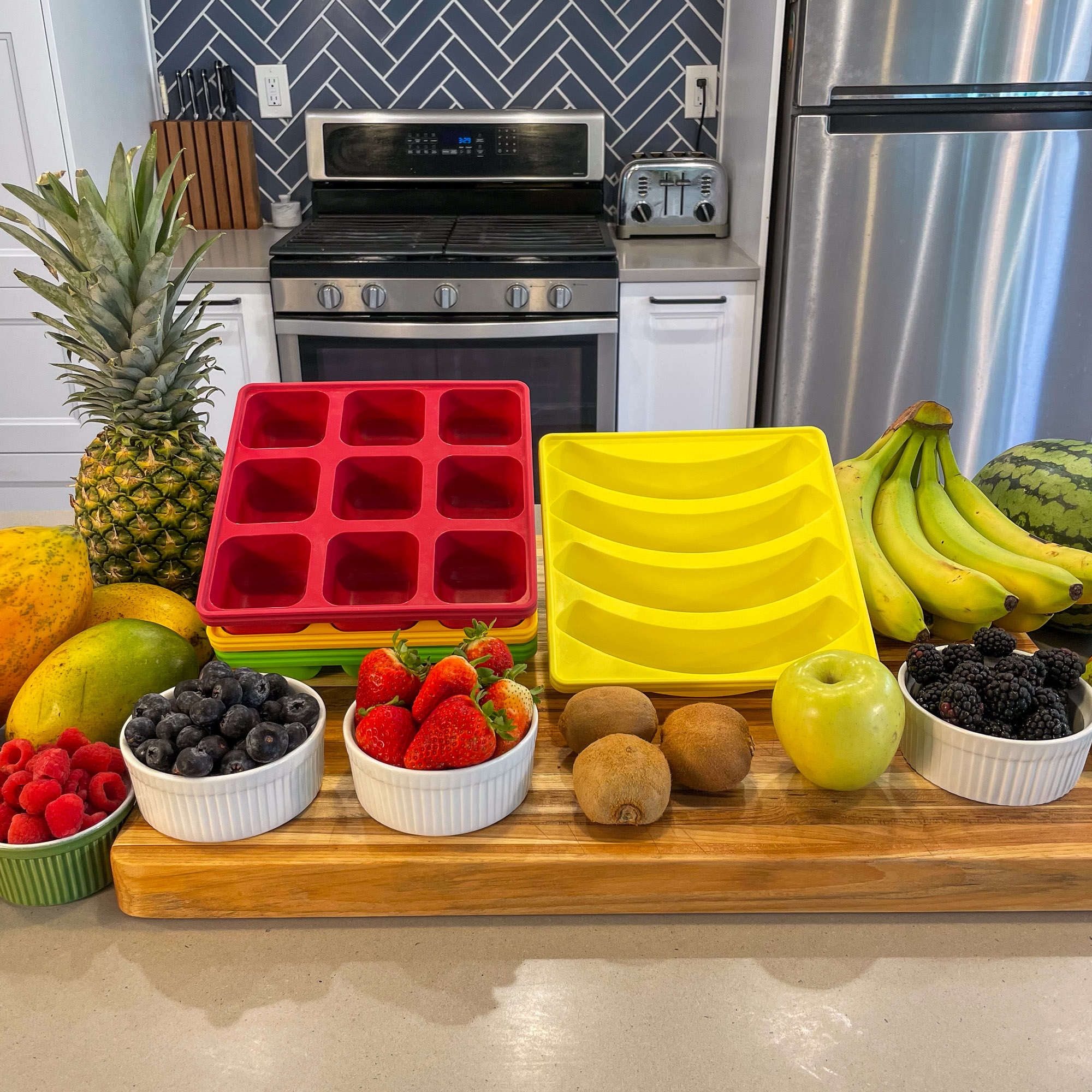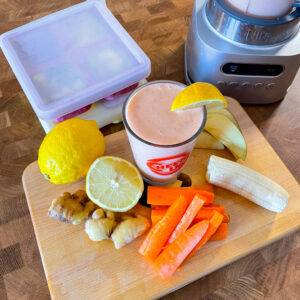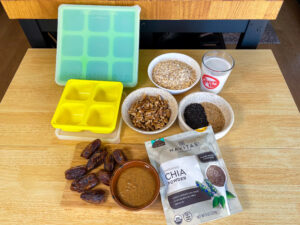When it comes to crafting the perfect smoothie, the choice of liquid base is just as crucial as the fruits and vegetables you blend in. The right liquid can enhance the flavor, adjust the consistency, and ramp up the nutritional value of your smoothie.
Let’s dive into the world of liquid smoothie bases, exploring their unique benefits and how they impact the final masterpiece in your glass.
The Classic Smoothie Liquid Bases
Water
Starting with the simplest option, water is the go-to liquid base for those who prefer their smoothies on the lighter side. It’s hydrating and ensures that the natural taste of your fruits and veggies remains unaltered.
There are many health benefits to being properly hydrated, meaning you can’t go wrong with water as a base for your smoothie. If you are concerned about your blend being too thin and watery, you can add a few ice cubes to chill it and thicken it up a bit.
If you don’t like the frosty feel of ice, there are plenty of other ingredients that make smoothies thicker, including frozen bananas, yogurt, nut butter, and more.
Benefits: Water hydrates without adding any calories, fats, or sugars, making it an excellent choice for calorie-conscious individuals.
Impact: Water won’t compete with the flavors of your fruits and greens, ensuring they shine through in every sip. However, it doesn’t contribute to creaminess, so it’s best used in smoothies where texture isn’t the main focus.
Traditional Milk
Dairy milk remains a classic and beloved choice for smoothie enthusiasts who appreciate its rich, creamy texture and nutritional benefits.
A great source of high-quality protein, dairy milk helps in muscle repair and growth, making it an excellent option for those looking to boost their protein intake naturally. It’s also packed with essential nutrients crucial for bone health, immune function, and maintaining blood pressure levels.
The versatility of dairy milk allows it to blend seamlessly with a wide range of ingredients, from the sweetest fruits to the most robust greens. Milk also enhances the smoothie’s creaminess without overpowering the natural flavors.
Whether you opt for whole, skim, or low-fat, dairy milk can adjust the calorie content of your smoothie to meet your dietary needs.
Benefits: Milk is a good source of quality protein and is packed with nutrients like calcium, vitamin D, potassium, and B12, which are lacking in many diets.
Impact: Cow’s milk is a comforting taste for many and an unbeatable choice contributing to a satisfyingly thick and smooth texture. Plus, its natural sweetness can reduce the need for added sugars, making your smoothie a healthier option.
Milk Alternatives
Almond Milk
Almond milk is a favorite among smoothie enthusiasts for its subtle nutty flavor and creamy texture. Unsweetened almond milk is low in calories but rich in vitamin E, an antioxidant that supports skin health and is important for your immune system.
It’s also dairy-free, making it a great option for those with lactose intolerance or dairy sensitivities. Plus, it can contribute to a smoother, creamier consistency without overwhelming the taste of your smoothie.
Benefits: It’s low in calories yet rich in vitamin E and magnesium. Plus, most commercial brands are fortified with calcium and vitamin D.
Impact: Almond milk adds a smooth, slightly creamy texture to smoothies without overpowering the taste of other ingredients. It’s versatile, pairing well with both fruity and green smoothies.
Oat Milk
Oat milk is another dairy-free alternative that’s gained popularity for its environmental sustainability and nutritional profile. It’s higher in carbohydrates and fiber compared to other plant-based milks, contributing to a feeling of fullness. Rich in B vitamins, particularly riboflavin (B2) and vitamin B12, oat milk supports energy metabolism and brain health.
Its naturally sweet and mild flavor complements a wide range of smoothie ingredients, adding a creamy texture without the need for dairy. Plus, it’s easy to make it home if you want to go all DIY. But, be aware that it won’t have the same nutritional profile as fortified store brands.
Benefits: Oat milk is a rich source of nutrients, especially if it’s fortified. It has more calories, carbs, and fiber than almond, soy, and cow’s milk, but less protein than soy and dairy milk.
Impact: With its slightly sweet flavor and creamy consistency, oat milk can make smoothies feel more like a meal. It works exceptionally well in smoothies aimed at keeping you full longer.
Soy Milk
Soy milk is a staple in the plant-based milk category, cherished for its balanced flavor and impressive nutritional profile, making it a worthwhile addition to your diet.
As one of the few plant milks that come close to dairy in terms of protein content, soy milk offers a complete protein source, meaning it provides all the essential amino acids your body needs. This makes it particularly beneficial for those following vegetarian or vegan diets, supporting muscle maintenance and overall health.
Benefits: Rich in vitamins and minerals, soy milk is fortified with calcium and vitamin D, ensuring it supports bone health similarly to dairy milk. It also contains isoflavones, unique compounds linked to a reduced risk of heart disease and improved cholesterol levels.
Impact: The mild, creamy texture of soy milk enhances smoothies without adding an overpowering taste, making it a versatile choice for any recipe.
Beyond the Basics
Coconut Water
For those looking for a tropical twist, coconut water is an excellent choice. It’s naturally sweet, hydrating, and packed with electrolytes like potassium, magnesium, and sodium.
Coconut water can enhance the tropical flavors of fruits like pineapple, mango, and papaya, creating a refreshing and rejuvenating drink.
Benefits: It’s naturally hydrating and packed with electrolytes like potassium, making it perfect for post-workout smoothies.
Impact: Coconut water adds a subtle tropical sweetness and helps create a refreshing, light texture. It’s ideal for balancing the flavors of tart fruits or potent greens without creating a dense, thick blend. Think of it as the upgrade to regular H2O.
Cashew Milk
Cashew milk is a lesser-known but equally delightful option for smoothies. It’s creamy and slightly sweet, with a lower calorie count than dairy milk. Cashew milk is a good source of healthy fats, magnesium, and iron, supporting bone health and energy levels. Its rich consistency enhances the luxurious feel of smoothies, making them more satiating.
Benefits: Cashew milk is loaded with nutrients, including unsaturated fats, protein, vitamins, and minerals. Store-bought types may be fortified with vitamin D and calcium.
Impact: Its naturally sweet and subtle flavor enhances the taste of other ingredients without stealing the spotlight, perfect for when you want a creamier, velvety smooth texture that’s still light on the palate.
Hemp Seed Milk
Hemp seed milk is a distinguished yet, less common, member of the plant-based milk family, known for its nutty flavor and exceptional nutritional benefits.
It stands out for its optimal balance of omega-3 and omega-6 fatty acids, rare in the plant milk realm, which promotes heart health. Hemp seed milk is also a fantastic source of plant-based protein, although not as high as soy, it still contributes significantly towards meeting daily protein requirements, making it especially valuable for those on vegan or vegetarian diets.
Benefits: Hemp seed milk is naturally rich in essential nutrients, including magnesium, iron, and zinc, supporting a wide range of bodily functions from enzyme activity to immune system support.
Impact: The unique, slightly nutty taste of hemp seed milk can add an interesting flavor dimension to smoothies without overwhelming other ingredients. Its creamy texture contributes to a luxuriously smooth blend, making it a superb choice for anyone looking to enrich their smoothies with both taste and density.
Exploring Uncharted Waters
Venture beyond traditional smoothie bases with two stimulating alternatives: green tea and coffee. These options not only infuse your smoothies with unique flavors but also come with their own set of health benefits and energizing effects.
Green Tea
Dive into the refreshing world of green tea as a smoothie base for an unparalleled antioxidant infusion. Celebrated for its high catechin content, green tea battles inflammation and bolsters overall wellness, making it a stellar choice for those seeking a healthful twist.
Its distinctive, earthy undertone enriches smoothies, lending a nuanced flavor that complements both fruits and veggies beautifully. Plus, the mild caffeine lift it provides is perfect for starting your day with a blend of energy and nutrition, all without adding any surplus calories to your drink.
Benefits: Green tea is infused with antioxidants that support the body’s defense against oxidative stress and aid in maintaining cardiovascular health. Its natural compounds have been linked to a variety of health advantages, including improved brain function, increased metabolism, and improved cognition.
Impact: Incorporating green tea into smoothies introduces a delicate and slightly earthy, yet refreshing flavor that can elevate the taste profile without being dominating. You’ll get a gentle caffeine kick along without contributing to a heavy or thick smoothie-drinking experience.
Coffee
Embrace the bold and robust essence of coffee in your next smoothie for a truly invigorating experience. Coffee, rich in antioxidants and renowned for its caffeine content, can elevate your smoothie into an energizing breakfast or a midday pick-me-up. Not without some controversy, coffee in the right amount is generally considered good for you.
Its deep, aromatic flavor pairs exceptionally well with ingredients like bananas, cocoa, and nut butter, creating smoothies that are not just nutritious but also indulgently satisfying. Incorporating coffee into your smoothie routine is a fantastic way to merge the worlds of your favorite morning rituals, offering both a flavor kick and a welcome energy boost.
Benefits: Coffee’s antioxidant profile aids in neutralizing free radicals, contributing to overall health protection and supporting metabolic health. Its caffeine content boosts alertness and concentration, making it a go-to for mental clarity and physical energy.
Impact: The deep, aromatic essence of coffee enriches smoothies with a distinct, satisfying flavor that pairs exceptionally well with creamy and chocolatey ingredients – contributing to a rich, velvety texture. Coffee is an outstanding choice for elevating the smoothie experience.
Looking for a better solution to prep smoothies for a hassle-free experience?
Check out Smootheeze silicone freezer trays.
The Foundation of Making Great Smoothies
As you can see, the options for liquid smoothie bases are many. Choosing the right liquid for your smoothie can transform not just its taste and texture but also its nutritional impact.
Whether you’re looking for hydration, a creamy texture, or a boost in vitamins and minerals, there’s a liquid base out there that’s perfect for your next smoothie creation. Experimenting with different options can lead to delicious discoveries and a more enjoyable smoothie experience.
Ready to blend up some magic?
Check out The Ultimate Collection of Timeless Smoothie Recipes
and take your smoothie game to the next level!
Happy blending!
FAQs About Selecting the Right Liquid Base for Smoothies
What is the best liquid base for smoothies?
The best liquid base for smoothies depends on your taste preferences and dietary needs. For a lighter, hydrating option, water or coconut water are great choices. For a creamier texture, traditional milk or plant-based options like almond or oat milk work well. Each liquid contributes differently to flavor and nutrition.
Can I use water as a liquid base for my smoothies?
Yes! Water is a great, calorie-free liquid base for smoothies if you’re looking to keep things light. While it won’t add creaminess, it hydrates and lets the natural flavors of your fruits and vegetables shine through. You can also add ice or thickening ingredients like bananas to adjust the texture.
What is the healthiest liquid to add to a smoothie?
Unsweetened almond milk, coconut water, and water are often considered the healthiest liquid bases because they are low in calories and sugar. If you’re looking for more nutrients, dairy milk or fortified plant-based milks like soy and oat milk provide vitamins, minerals, and protein.
What are good dairy-free liquid bases for smoothies?
Almond milk, oat milk, coconut water, and soy milk are popular dairy-free liquid bases. They add different flavors and textures to smoothies, and many are fortified with nutrients like calcium and vitamin D. Oat milk, for example, is known for its creamy texture, while coconut water offers a tropical, hydrating touch.
How does the choice of liquid base affect the texture of my smoothie?
The liquid base you choose has a big impact on the texture of your smoothie. Water and coconut water create a thinner, lighter consistency, while dairy milk, almond milk, and oat milk add creaminess and thickness. For a velvety, rich texture, plant-based milks like cashew or hemp seed milk are excellent options.
Is coconut water a good liquid for smoothies?
Yes! Coconut water is a fantastic liquid base for smoothies, especially if you’re looking for a light, hydrating option. It’s naturally sweet and packed with electrolytes, making it ideal for post-workout smoothies or tropical fruit blends like mango or pineapple.
What is the proper technique for layering ingredients in a smoothie?
To get a perfectly blended smoothie, layer your ingredients starting with the liquid base at the bottom. This helps the blades move freely and prevents chunks. Next, add soft ingredients like yogurt or nut butter, followed by fresh leafy greens, fruits, and vegetables. Finally, place any frozen fruits, ice, or thicker ingredients on top. This layering technique ensures a smooth, consistent blend without overworking your blender.




